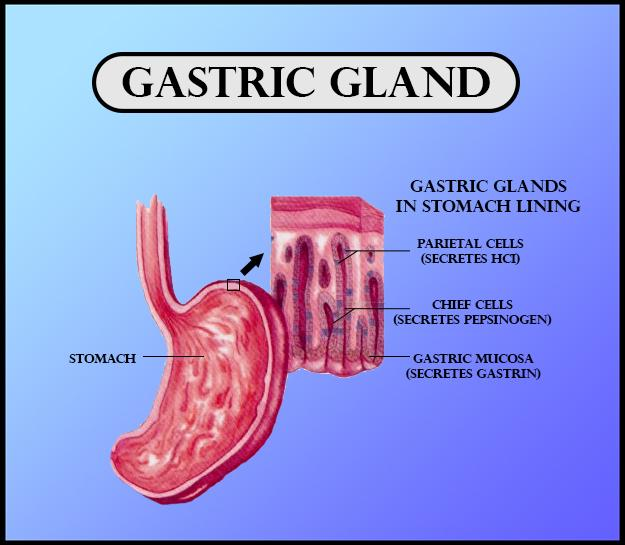
Pepsin acts in
(a) Basic medium
(b) Acidic medium
(c) neutral medium
(d) All of these
Answer
586.2k+ views
Hint: Pepsin is released in the gastric lumen in its precursor or inactive form as it is a proteolytic enzyme. It cleaves proteins into its smaller subunits in its active form which can be only achieved in a particular extreme medium.
Complete step by step answer:
The pepsinogen is secreted by the chief cells of the stomach. Pepsinogen is converted into its activated form pepsin only in the acidic medium which is maintained by the secretion of concentrated HCl by gastric parietal cells. Pepsin is an endopeptidase (that breaks peptide bonds) enzyme, it hydrolyses the proteins into peptones and proteases. The activated pepsin acts as an autocatalyst and activates another pepsinogen into pepsin.
- The secretions of the gastric glands are collectively referred to as gastric juice. They are located in the mucosa layer of the alimentary canal.
- Chief cells or zymogen cells secrete pepsinogen in its inactive form that upon conversion to pepsin initiates the digestion of proteins.

- Parietal cells or oxyntic cells secrete HCl that not only provides an acidic medium for various metabolic reactions in the stomach but also kills any pathogens that may have entered the alimentary canal via the intake of food.
- Parietal cells also release an intrinsic factor that helps in the absorption of Vitamin B12.
- Mucous cells release alkaline mucus to protect the stomach wall from the corrosive action of HCl.
- Gastric juice also contains gastric lipase that helps in the digestion of triglycerides. Its action is minimal in the highly acidic environment of the lumen of the stomach.
So, the correct answer is ‘(b) Acidic medium.’
Note:
- The gastric juices contain no carbohydrates digesting enzymes, so there is no digestion of carbohydrates in the stomach.
- Certain G- cells are also located in the gastric mucosa and secretes a hormone named gastrin. It stimulates the parietal cells to release HCl and chief cells to release pepsinogen.
Complete step by step answer:
The pepsinogen is secreted by the chief cells of the stomach. Pepsinogen is converted into its activated form pepsin only in the acidic medium which is maintained by the secretion of concentrated HCl by gastric parietal cells. Pepsin is an endopeptidase (that breaks peptide bonds) enzyme, it hydrolyses the proteins into peptones and proteases. The activated pepsin acts as an autocatalyst and activates another pepsinogen into pepsin.
- The secretions of the gastric glands are collectively referred to as gastric juice. They are located in the mucosa layer of the alimentary canal.
- Chief cells or zymogen cells secrete pepsinogen in its inactive form that upon conversion to pepsin initiates the digestion of proteins.

- Parietal cells or oxyntic cells secrete HCl that not only provides an acidic medium for various metabolic reactions in the stomach but also kills any pathogens that may have entered the alimentary canal via the intake of food.
- Parietal cells also release an intrinsic factor that helps in the absorption of Vitamin B12.
- Mucous cells release alkaline mucus to protect the stomach wall from the corrosive action of HCl.
- Gastric juice also contains gastric lipase that helps in the digestion of triglycerides. Its action is minimal in the highly acidic environment of the lumen of the stomach.
So, the correct answer is ‘(b) Acidic medium.’
Note:
- The gastric juices contain no carbohydrates digesting enzymes, so there is no digestion of carbohydrates in the stomach.
- Certain G- cells are also located in the gastric mucosa and secretes a hormone named gastrin. It stimulates the parietal cells to release HCl and chief cells to release pepsinogen.
Recently Updated Pages
Master Class 11 Computer Science: Engaging Questions & Answers for Success

Master Class 11 Business Studies: Engaging Questions & Answers for Success

Master Class 11 Economics: Engaging Questions & Answers for Success

Master Class 11 English: Engaging Questions & Answers for Success

Master Class 11 Maths: Engaging Questions & Answers for Success

Master Class 11 Biology: Engaging Questions & Answers for Success

Trending doubts
One Metric ton is equal to kg A 10000 B 1000 C 100 class 11 physics CBSE

There are 720 permutations of the digits 1 2 3 4 5 class 11 maths CBSE

Discuss the various forms of bacteria class 11 biology CBSE

Draw a diagram of a plant cell and label at least eight class 11 biology CBSE

State the laws of reflection of light

Explain zero factorial class 11 maths CBSE




